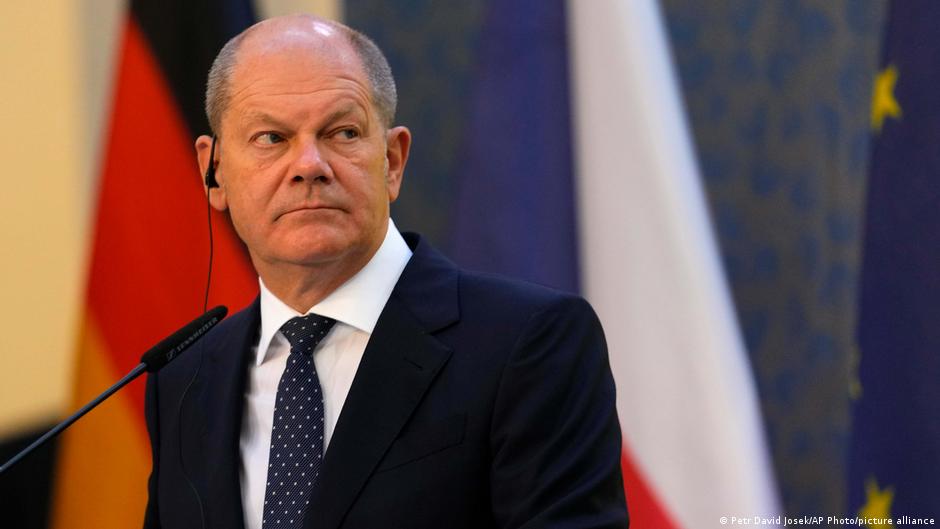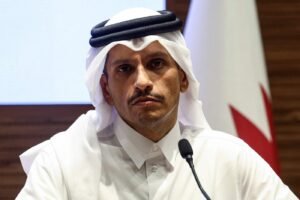
The German chancellor made his way to the Gulf region in a bid to secure LNG deals for his country that is looking to abandon Russian energy.
German Chancellor Olaf Scholz has tested positive for coronavirus and is currently experiencing mild cold-like symptoms, according to a government official.
The German top official is isolating in the federal chancellery, Reuters reported.
This week, he has canceled all of his public engagements, although he is still expected to participate in virtual meetings. The latest update comes after Sholz wrapped up a tour of the Gulf region that included a meeting with Qatar’s Amir Sheikh Tamim bin Hamad Al Thani.
With Berlin looking to secure energy deals and find alternative energy sources as it gradually halts its energy dependence on Russian gas, Scholz visited three Gulf Cooperation Countries, beginning with Saudi Arabia and the United Arab Emirates and ending with Qatar on Sunday.
The largest economy in Europe hopes to replace all Russian energy imports by as early as mid-2024.
Germany is set to receive liquefied natural gas (LNG) by the end of December thanks to a contract German utility RWE has struck with Abu Dhabi National Oil Company (ADNOC) while Scholz stopped in UAE after his Saudi Arabia visit. RWE made the announcement on Sunday.
The agreement, which includes a Memorandum of Understanding for multiple-year LNG deliveries, was reached on the second day of Scholz’s two-day visit to the Gulf region.
“We need to make sure that the production of LNG in the world is advanced to the point where the high demand that exists can be met without having to resort to the production capacity that exists in Russia,” Scholz told journalists before the deal was announced, according to Reuters.
According to RWE, ADNOC will send a cargo of 137,000 cubic meters of LNG this year, the first LNG to be transported via the floating LNG import terminal at Brunsbüttel near Hamburg to the German gas market.
German bids for Qatari gas
During a press conference in Doha on Sunday, Sheikh Tamim revealed that QatarEnergy and German energy firms are considering potential options, indicating in order to meet the rising worldwide demand for gas, Doha has been preparing to expand its North Gas Field for years.
However, no further details were provided of an official energy agreement signed between the two sides.
The reports did, however, mention that RWE and Uniper are “unlikely” to sign contracts with Qatar during Scholz’s visit because, according to one of the sources, governments and business leaders normally reach broad agreements first and then work on the specifics.
As of last week, reports privy to the matter said that German utilities RWE and Uniper were inching closer to sealing long-term agreements to purchase LNG from Qatar’s North Field Expansion project in an attempt to replace Russian gas.
Differences in important conditions, such as contract length and price, have thrown a spanner in the negotiations between Germany and Qatar, however according to the unnamed industry sources, the parties were expected to reach a ‘compromise’ soon, Reuters reported.
Although supply agreements with Qatar pose a great advantage to Germany, they do not provide a quick fix to Berlin’s energy crisis since Qatar’s massive North Field Expansion plan is not anticipated to be operational until the year 2026, Reuters said.
In May, Reuters reported that the negotiations had stalled due to Germany’s lack of willingness to sign contracts that would last for at least 20 years, wanting to tie costs to Dutch benchmark gas prices rather than oil.
As it stands, the two utilities already purchase LNG from Qatar on the spot market. In 2016, RWE struck a deal with Qatar for up to 1.1 million tonnes of LNG annually, which is set to end by next year, according to Bloomberg.
Germany, energy, Russian invasion
Europe receives 40% of its gas supplies from Russia as almost a third of the shipments pass through Ukraine. If Russia implements an actual embargo on gas supplies to European countries, Germany and Italy would be especially “vulnerable.”
Germany’s reliance on Russian gas and oil has decreased from 55% to 35% and 12% to 12% respectively since the onset of Moscow’s invasion.
For decades, German governments have “pursued a strict policy of not sending weapons to crisis regions,” reports noted. The country’s stance with regards to arms deliveries has changed drastically as Berlin initially refused to supply military aid to Ukraine in the ongoing crisis.
In what has been described, in February, to be a “historic parliamentary session,” Scholz announced his government’s decision to provide Kyiv with weapons, to support a series of sanctions against Russia, and to enhance defence spending.
At the time, German Economy Minister Robert Habeck, in an exclusive interview with Frankfurter Allgemeine Sonntagszeitung Newspaper, said that he plans on making Germany independent of Russian coal and gas in less than a year.
“Every day, in fact every hour, we say goodbye to Russian imports to a certain extent,” Habeck told the newspaper. “If it works, we will be independent of Russian coal in the autumn and almost independent of oil from Russia by the end of the year,” he added.







